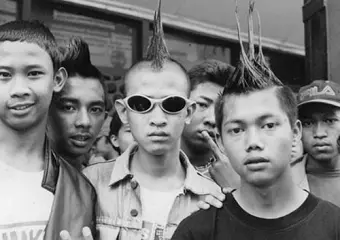Making Scenes
Reggae, Punk, and Death Metal in 1990s Bali
Format:Hardback
Publisher:Duke University Press
Published:11th Dec '07
Currently unavailable, and unfortunately no date known when it will be back

An ethnography of reggae, punk, and death metal in the context of media globalization and the demise of Bali's New Order regime.
An ethnographic exploration of identity politics in three of Balis musical subcultures—reggae, punk, and death metal—during the 1990s.In 1996, Emma Baulch went to live in Bali to do research on youth culture. Her chats with young people led her to an enormously popular regular outdoor show dominated by local reggae, punk, and death metal bands. In this rich ethnography, she takes readers inside each scene: hanging out in the death metal scene among unemployed university graduates clad in black T-shirts and ragged jeans; in the punk scene among young men sporting mohawks, leather jackets, and hefty jackboots; and among the remnants of the local reggae scene in Kuta Beach, the island’s most renowned tourist area. Baulch tracks how each music scene arrived and grew in Bali, looking at such influences as the global extreme metal underground, MTV Asia, and the internationalization of Indonesia’s music industry.
Making Scenes is an exploration of the subtle politics of identity that took place within and among these scenes throughout the course of the 1990s. Participants in the different scenes often explained their interest in death metal, punk, or reggae in relation to broader ideas about what it meant to be Balinese, which reflected views about Bali’s tourism industry and the cultural dominance of Jakarta, Indonesia’s capital and largest city. Through dance, dress, claims to public spaces, and onstage performances, participants and enthusiasts reworked “Balinese-ness” by synthesizing global media, ideas of national belonging, and local identity politics. Making Scenes chronicles the creation of subcultures at a historical moment when media globalization and the gradual demise of the authoritarian Suharto regime coincided with revitalized, essentialist formulations of the Balinese self.
“Making Scenes is as good a balance of theoretical innovation, ethnographic observation, and musical ‘scene’ analysis as I have seen in a long time. It is also the best account I have seen of the international circulation of 1990s alternative U.S. rock outside the United States.” —Will Straw, author of Cyanide and Sin: Visualizing Crime in 50s America
“Timely and engaging, Making Scenes is a wonderful and needed contribution to scholarship on Bali, to debates over the relationship between Birmingham School cultural studies and the work of area studies, and to the transnational study of popular music.” — Laurie J. Sears, editor of Knowing Southeast Asian Subjects
“[A] beautifully written and theoretically sophisticated book. . . presenting a complex and appropriately messy account of musical practice as it plays out in the serious games of Indonesian youth.” -- Brent Luvaas * Indonesia *
“Emma Baulch explores the self-professed underbelly of 1990s Balinese music culture in a nuanced ethnography that demonstrates a serious and intimate understanding of the people and events she describes. . . . [E]xceptional.” -- Laura Noszlopy * Journal of the Royal Anthropological Institute *
“Emma Baulch’s detailed ethnography of musical scenes and identity politics in 1990s Bali is a major contribution to the scholarly literature on music and culture in Indonesia. . . . [T]his well-written work stands out among recent publications on Indonesian popular, rock, experimental, and underground music culture. . . . Making Scenes is a well-crafted, insightful exploration of the complex identity politics at work in the social, political, and cultural contexts of 1990s Bali. With its engaging depictions of musical scenes, detailed analyses of youth culture, and deep engagement with cultural theory, this text will appeal to scholars, graduate students, and advanced undergraduate students. . .” -- Bethany J. Collier * Journal of Asian Studies *
ISBN: 9780822340959
Dimensions: unknown
Weight: 481g
248 pages